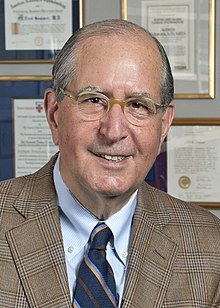Alfred Sommer (doctor)
Alfred Sommer (* 1942 in New York City ) is an American doctor ( epidemiology , ophthalmology ).
Sommer studied at Union College in Schenectady (Bachelor's degree in 1963) and at Harvard Medical School , where he received his MD. In 1973 he received his Diploma in Public Health (MHS) from the Johns Hopkins University School of Hygiene and Public Health. From 1976 to 1980 he headed a program to combat vitamin A deficiency in Indonesia . He has been Professor of Ophthalmology at the Johns Hopkins University School of Medicine since 1980 and Professor of Epidemiology and International Health at the Bloomberg School of Public Health there, of which he was Dean from 1990 to 2005.
Sommer is known for research in the 1970s and 1980s on the effects of vitamin A deficiency in children in developing countries, where this was an important factor in mortality from measles and diarrheal diseases, for example (via the already known role in xerophthalmia , the leading to blindness). He also showed the effectiveness of a simple therapy with twice-yearly vitamin A doses in children with vitamin A deficiency, reducing mortality rates by over a third. He headed the International Vitamin A Consulative Group, coordinating the efforts of WHO , UNICEF , FAO and other organizations to combat vitamin A deficiency in the developing world.
In 1997 he received the Prinz Mahidol Prize and the Albert Lasker Award for Clinical Medical Research . In 2001 he received the Danone International Prize for Nutrition , the Warren Alpert Foundation Prize in 2002 and the Dan David Prize in 2013 . In 2001, Sommer was elected to the National Academy of Sciences .
Web links
Individual evidence
- ↑ A. Sommer, I. Tarwotjo, E. Djunaedi, KP West Jr, AA Loeden, R. Tilden, L. Mele: Impact of vitamin A supplementation on childhood mortality. A randomized controlled community trial. In: Lancet. May 24, 1986, pp. 1169-1173.
| personal data | |
|---|---|
| SURNAME | Summer, Alfred |
| BRIEF DESCRIPTION | American medic |
| DATE OF BIRTH | 1942 |
| PLACE OF BIRTH | New York City |
